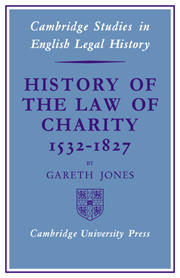Book contents
- Frontmatter
- Contents
- Preface
- List of Abbreviations
- Table Of Statutes
- Table Of Cases
- THE DEVELOPMENT OF THE LAW OF CHARITY 1532–1700
- I Introduction: Charity Before the Reformation
- II The Reformation and the Law of Charity
- III The Statutes of Charitable Uses: 39 Elizabeth I c. 6 and 43 Elizabeth I c. 4
- IV The Development of the Law of Charity, 1545–1700: A Definition of Charity
- V The Development of the Law of Charity, 1545–1700: The Privileges of Charity
- THE DEVELOPMENT OF THE LAW OF CHARITY 1700–1827
- Appendixes
- Index
II - The Reformation and the Law of Charity
Published online by Cambridge University Press: 07 October 2011
- Frontmatter
- Contents
- Preface
- List of Abbreviations
- Table Of Statutes
- Table Of Cases
- THE DEVELOPMENT OF THE LAW OF CHARITY 1532–1700
- I Introduction: Charity Before the Reformation
- II The Reformation and the Law of Charity
- III The Statutes of Charitable Uses: 39 Elizabeth I c. 6 and 43 Elizabeth I c. 4
- IV The Development of the Law of Charity, 1545–1700: A Definition of Charity
- V The Development of the Law of Charity, 1545–1700: The Privileges of Charity
- THE DEVELOPMENT OF THE LAW OF CHARITY 1700–1827
- Appendixes
- Index
Summary
The Reformation statutes were the legal culmination of a complex social and religious revolution which affected all aspects of English life. The overthrow of papal supremacy and the decline of the authority of organised religion was paralleled by, what Professor Dickens has called, ‘a change of viewpoint concerning the nature and functions of religion, both in the individual and in society.’ One manifestation of such a change was in the character of man's philanthropy. The objects of charity were to become more secular as the majority of Englishmen reflected less on the fate of their souls and became more concerned with the worldly needs of their fellow men.
Englishmen had always devoted considerable property to the endowment of chantries, but these endowments had not always been applied for the purposes intended by their founders. Complaints that chantries had been allowed to lapse and that their endowments had been appropriated by the priest, the founder or the founder's heirs were not infrequent, and their maladministration was the principal reason given in the Henrician statute of 1545 for their eventual suppression.
The destruction of the chantries had profound educational and religious consequences which have tended to overshadow the effect of the chantry statutes on the English law of charity. For lawyers the chantry statutes are significant in that with their enactment emerges the conception of the superstitious use, so called because it was a use which supported false (superstitious), religious purposes.
- Type
- Chapter
- Information
- History of the Law of Charity, 1532-1827 , pp. 10 - 15Publisher: Cambridge University PressPrint publication year: 1969
- 1
- Cited by



